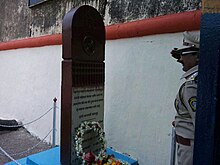| Naik Raghojirao Ramjirao BhangrePatil of Devgaon | |
|---|---|
 | |
| Born | Raghoji 8 November 1805 (1805-11-08) Devgaon, Akole, India |
| Died | 2 May 1848 (1848-05-03) (aged 42) |
| Cause of death | Hanged |
| Burial place | Umbhrai |
| Other names | Raghuji, Raghojee |
| Occupation | Patil of Devgaon |
| Era | British era |
| Organization | Bandkari |
| Title |
|
| Predecessor | Ramjirao Manajirao Bhangre |
| Movement | Indian independence movement |
| Family | Bapuji Bhangare (brother) |

Raghojirao Ramjirao Bhangre also spell Bhangaria (8 November 1805 – 2 May 1848) was an Indian revolutionary who challenged and defied the British power in Maharashtra. He was the son of Ramji Bhangre, a Koli who also resisted the British rule and was subsequently hanged in Cellular Jail. he was only ten years old when he took up arms against British rule in Maharashtra.
Death
On 2 May 1848, Bangre was caught by Lieutenant-General Gell and hanged.
Tribute

In 2014, The Chief minister of Maharashtra, Prithviraj Chavan inaugurated a Circuit House in Thane named after Raghoji.
See also
References
- ढोमणे, सौ शिल्पा (21 April 2016). Veer Raghoji Bhangre / Nachiket Prakashan: वीर राघोजी भांगरे (in Marathi). Nachiket Prakashan.
- "Adivasis celebrate and demand of basic amenities on 'World Indigenous Day'". Mumbai Live. Retrieved 7 April 2019.
- "राघोजी भांगरे यांचा लढा भावी पिढीला प्रेरणादायी". Maharashtra Times (in Marathi). 4 May 2014. Retrieved 7 April 2019.
- Guha, Sumit (2 November 2006). Environment and Ethnicity in India, 1200-1991. Cambridge University Press. ISBN 9780521028707.
- Hardiman, David; Hardiman, Professor of History David (1996). Feeding the Baniya: Peasants and Usurers in Western India. New Delhi, India: Oxford University Press. p. 226. ISBN 978-0-19-563956-8.
- Keer, Dhananjay (1997). Mahatma Jotirao Phooley: Father of the Indian Social Revolution. Popular Prakashan. ISBN 9788171540662.
- Kennedy, Michael (1985). The Criminal Classes in India. Mittal Publications.
- "Uddhav distances himself from Saamana edit against Gujaratis". The Indian Express. 3 May 2014. Retrieved 7 April 2019.
Further reading
- Krishan, Shri (7 April 2005). Political Mobilization and Identity in Western India, 1934-47. New Delhi: SAGE Publishing India. ISBN 9789352803071.